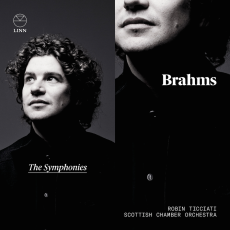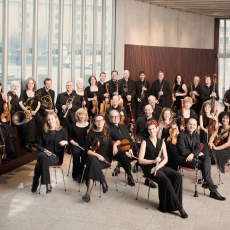Robin Ticciati & SCO - Brahms: The Symphonies - Klassiskmusikk.com
I knew from the very first chord of the first movement of the First Symphony that this new cycle was going to be special: the attack is sharp, incisive, that opening timpani thwack shallow and fierce. And all the way through all four symphonies, the combination of the chamber-orchestral clarity of texture and Robin Ticciati’s eagle eye for detail opens up one thrill after another: little accompanimental figures suddenly become an essential part of the narrative; throwaway woodwind shapes are now essential commentaries on the unfolding drama, repetitive rhythms take on unsuspected meaning – every single detail in the score is brought alive in sounding sense. Ticciati’s not a prisoner of the page, either: he’s not afraid to accelerate towards a climax or slam on the brakes for dramatic effect. The smaller string sections are complemented by brighter, small-bore brass, giving the music an almost French colour at times (this is the first time I’ve ever noticed a connection between Brahms and Berlioz), and the timpani, as I’ve mentioned, are crisp and precise. The more intimate scale liberates colour, too, with woodwind, brass and strings underlining the delicacy and sensitivity of Brahms’ orchestration. The reduction in the number of the upper strings frees up the bass, so that the sound is darker than usual, which in turn gives Brahms’ more lyrical lines an added expressive urgency – and these are already unusually urgent performances: this Brahms is lean and lithe, fleet of foot and of mind, not the flabby old composer waddling down to the pub that he becomes in so many over-indulgent performances.
Of course, such a radical reassessment changes the nature of the symphonies themselves, and all four turn into striking different statements – it’s no exaggeration to say that these performances find a kind of existential terror in Brahms’ soul, and it perforce pulls in us listeners; the music has become frightening, and you emerge from the experience shaken but aware of having experienced something basic in the human condition, of having gazed on true greatness. No. 3 was an especial concern for me: for me, that opening phrase ought to be a scream of almost primal intensity, and I once spent an evening listening to every single version I could find on YouTube. Nobody got it right – Bernstein and the Vienna Phil came closest. Well, Ticciati and the SCO pretty well nail it here, capturing both the pain of the first movement and the profound sadness of the third. I think I know these four symphonies as well as I know anything in music, and yet I have already learned an enormous amount from these recordings. I’ve played them again and again since my review copy arrived, and I’m still noticing more details that have been thought through afresh. You will, I hope, find these readings exciting and moving in equal measure, and I can hardly recommend them to you strongly enough.


